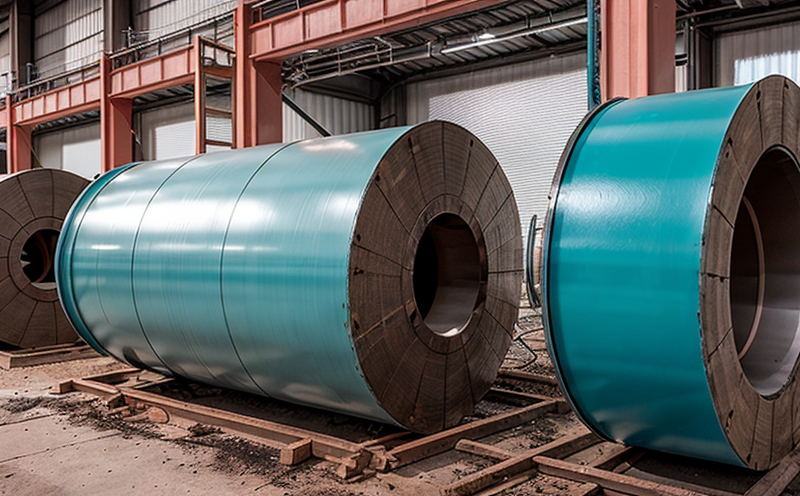ASTM G110 Corrosion Testing of Aluminum Alloys by Exfoliation
The ASTM G110 standard provides a method to evaluate the resistance of aluminum alloys to intergranular corrosion, particularly under conditions that promote exfoliation. This form of corrosion can lead to catastrophic failure in critical components and structures exposed to harsh environments. By understanding the susceptibility to this type of corrosion, manufacturers and quality assurance teams can improve product design and material selection.
This testing method is crucial for industries such as aerospace, automotive, and marine, where the integrity of aluminum components directly impacts safety and performance. The ASTM G110 test focuses on the intergranular dissolution that occurs at grain boundaries, which can cause layers to peel away from each other (exfoliation). This process is accelerated by specific environmental conditions like humidity or chloride presence.
The procedure involves exposing a polished specimen to an aqueous chloride solution under controlled temperature and relative humidity. The rate of exfoliation is monitored over time using visual inspection, weight loss measurement, or gravimetric analysis. The test duration can vary depending on the alloy being evaluated but typically ranges from 50 hours to several weeks.
The ASTM G110 standard ensures that all testing laboratories follow uniform procedures and criteria. This consistency allows for accurate comparison of results across different facilities, which is essential in a global market. Compliance with this standard also helps manufacturers meet regulatory requirements set by agencies like the Federal Aviation Administration (FAA) or the European Union's Aerospace Standards.
Understanding the specific conditions that lead to exfoliation corrosion is vital for optimizing material properties and surface treatments. For instance, certain alloying elements can enhance resistance against intergranular corrosion. Additionally, heat treatment processes play a critical role in stabilizing grain structures, thereby reducing susceptibility to this form of corrosion.
In summary, ASTM G110 testing provides valuable insights into the durability of aluminum alloys under specific environmental conditions. This information is indispensable for ensuring product reliability and safety across various industries. By leveraging these test results, manufacturers can make informed decisions about material selection and process optimization.
Quality and Reliability Assurance
The ASTM G110 corrosion testing of aluminum alloys by exfoliation is a cornerstone in quality assurance processes within the industrial sector. Ensuring that products meet stringent standards not only enhances customer satisfaction but also contributes to overall industry trustworthiness.
- Consistency: The standard ensures consistent results across different laboratories, facilitating reliable comparisons and reproducibility of test outcomes.
- Regulatory Compliance: By adhering to ASTM G110, manufacturers can ensure their products comply with relevant regulations set by aviation authorities, maritime bodies, or other governing organizations.
- Improved Product Life: Understanding the exfoliation corrosion behavior helps in optimizing material properties and manufacturing processes, leading to longer-lasting products.
Quality assurance teams benefit significantly from this testing method as it allows them to identify potential weaknesses early in the development cycle. This proactive approach can lead to significant cost savings by avoiding costly recalls or product failures post-launch.
R&D engineers also find value in ASTM G110 due to its ability to provide detailed insights into material behavior under specific conditions. These data points are invaluable for refining existing materials and developing new ones tailored specifically for demanding applications.
For procurement departments, knowing that suppliers undergo rigorous testing according to established standards like ASTM G110 adds another layer of confidence in the quality of purchased raw materials or finished goods. This ensures that all components meet the necessary performance criteria before integration into larger systems.
Environmental and Sustainability Contributions
The ASTM G110 corrosion testing method contributes positively to environmental sustainability efforts by promoting the use of durable, long-lasting materials in industrial applications. By identifying aluminum alloys that are resistant to exfoliation corrosion, manufacturers can reduce waste associated with premature failures or replacements.
- Resource Efficiency: Durable products mean less frequent replacement, which reduces demand for raw materials and subsequent environmental impacts during extraction and processing.
- Energy Savings: Longer-lasting components often require fewer maintenance interventions, potentially lowering energy consumption associated with repeated repairs or replacements.
- Reduced Waste: Enhanced product life spans contribute to lower disposal rates, helping minimize landfill burdens and promoting recycling practices.
The ASTM G110 test supports sustainable design principles by encouraging the selection of materials that perform well under challenging environments without compromising on safety or performance. This aligns with broader sustainability goals set forth by various international bodies including ISO (International Organization for Standardization) and the European Union's Circular Economy Action Plan.
Through consistent adherence to this standard, industries can contribute towards reducing their carbon footprint while maintaining high levels of product reliability. Such efforts underscore the importance of robust quality assurance measures in driving sustainable development across sectors.
Use Cases and Application Examples
| Industry Sector | Description |
|---|---|
| Aerospace | Testing aluminum components like fasteners, structural parts, and landing gear for resistance to intergranular corrosion. |
| Automotive | Evaluating body panels, suspension systems, and exhaust systems for durability in challenging environmental conditions. |
| Marine | Assessing hull plates, propellers, and other marine hardware for resistance to saltwater corrosion. |
| Construction | Testing structural elements exposed to harsh weather conditions for long-term stability. |
The ASTM G110 test is widely used across various industries where aluminum alloys are employed in critical applications. Aerospace manufacturers, for example, rely heavily on this testing method to ensure the reliability of aircraft components under extreme environmental stressors. Similarly, automotive companies use it to evaluate body and chassis parts subjected to corrosive conditions during operation.
In the marine sector, ASTM G110 plays a vital role in assessing hull plating materials exposed to saltwater environments. By identifying alloys that withstand exfoliation corrosion, shipbuilders can enhance fleet durability and reduce maintenance costs associated with premature degradation.
For construction applications, this test helps architects and engineers select appropriate aluminum products for building facades or structural supports exposed to prolonged outdoor exposure. The results from ASTM G110 ensure that these materials maintain their integrity over extended periods, contributing to sustainable urban development projects.





